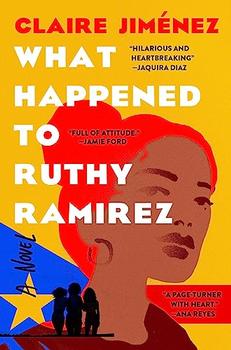Summary | Excerpt | Reading Guide | Reviews | Beyond the Book | Readalikes | Genres & Themes | Author Bio

¿Cómo habré de llamarme cuando sólo me quede
recordarme, en la roca de una isla desierta?
—Julia de Burgos, "Poema para mi muerte"
What shall I be called when all remains of me
is a memory, upon a rock of a deserted isle?
—Julia de Burgos, "Poem for my death"
(Trans. Vanessa Pérez-Rosario)
If you drew a map of our family history, you might start it off with my dad, young, fat, and handsome, eighteen-year-old Eddie Ramirez, plotting to get with my moms, who was dark-skinned, small and freckled, long black curly hair. Freshly turned seventeen. Her name is Dolores. And you can probably start it off in Brooklyn. Canarsie. Draw a bump underneath my mother's wedding dress—that's Jessica. Then shortly after, in 1981, you can make Jessica a separate person, angry and red, pale-skinned like my dad, screaming in my mother's arms. Two years later draw Ruthy in pencil, lightly, because you're going to need to erase her in a couple of minutes. Now, draw the Verrazano, the water, the Island, the dump. Draw my proud family, Puerto Rican and loud, driving over the bridge and a little pink town house in West Brighton. I'm the one born in 1986, in Staten Island. They named me Nina. Make me look cute. The five of us seem normal for a while, up until Ruthy turns thirteen and disappears. Now you can rub her body away from the page. Draw my mother sixty-two pounds later. Give her diabetes. Kill my dad. Cut a hole in the middle of the timeline. Eliminate the canvas. Destroy any type of logic. There is no such thing now as a map.
Call that black hole, its negative space, the incredible disappearance of Ruthy Ramirez.
Chapter 1
Nina
Afterwards, sometimes, as a teenager, I would stand at the bus stop where my sister went missing, concentrating on the deli down the block, the way the sign on its front door would blink the word Open. I tell you, I would stand there squinting for so long that sometimes a bus would stop and mistake me for somebody waiting. I tried to picture it, 1996: thirteen-year-old Ruthy standing there outside after track practice, five o'clock, alone, book bag graffitied by Sharpies, her red hair knotted and wrapped into a bun. In my head, I'd play out all the different scenarios—our family, shakily divided across a three-way split-screen mounted on the wall in my brain.
While Ruthy was shivering at the bus stop waiting for the S48, as she always did after track practice, me, Jess, and Ma would have already been at home, the handouts for my fourth-grade homework scattered on top of the table, Ma flicking the last pieces of wet onion clinging to her fingers into a hot pan. That night Jess had taken the phone from the kitchen into the small downstairs bathroom so she could whisper into the receiver in private—some sophomore-year secret that nobody even really cared about anyway; still, she lowered her voice. On the other side of the Island, by the mall, my father, who managed a hardware store, would be in the middle of a shift, helping the receiving crew unload a truck of refrigerators, jamming a finger between the twenty-foot shelving and a hand cart, cursing out the motherfucker who sideswiped him with a shopping cart, "Puñeta."
The alarm did not sound until seven o'clock, when Ma stood on her toes to pull a stack of dishes out of the cabinet and plate the pollo guisado.
Ruthy should've been home by six.
Six fifteen at the latest.
Suddenly aware of the time, Ma wiped her hands on the back of her tight jeans and blinked, then tilted her head to the side and stared past me, as if she were having some otherworldly vision.
"Nina, where is your sister?" she asked me from the stove.
As if I could answer.
I was still trying to remember how to add two fractions with different denominators. A series of multiplication signs were floating on my handout. The paper was disintegrating where I tried too hard to erase away my mistakes.
Excerpted from What Happened to Ruthy Ramirez by Claire Jimenez. Copyright © 2023 by Claire Jimenez. Excerpted by permission of Grand Central Publishing. All rights reserved. No part of this excerpt may be reproduced or reprinted without permission in writing from the publisher.
Talent hits a target no one else can hit; Genius hits a target no one else can see.
Click Here to find out who said this, as well as discovering other famous literary quotes!
Your guide toexceptional books
BookBrowse seeks out and recommends the best in contemporary fiction and nonfiction—books that not only engage and entertain but also deepen our understanding of ourselves and the world around us.